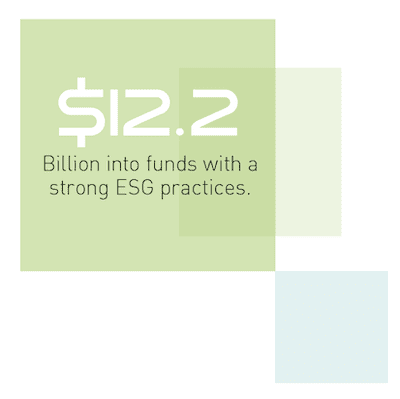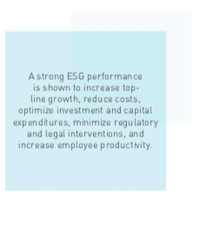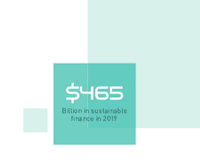This article appears in Summit Journal (Summer 2020) | Download PDF
Sustainability—with ESG (environmental, social, governance) data as its prevailing metric—is far from a new business concern. Though ESG may have only recently caught fire in the commercial real estate industry, investors have long been aware of its power to illuminate a company’s ability to maintain profitability, retain talent, and withstand unexpected disasters and disruptions.

Now, as we find ourselves in the midst of a global pandemic, literally every industry is racing to adjust its business practices to meet new demands and prepare for an uncertain future. One thing is clear, however: ESG will continue to be top of mind for investors, and likely even more so in an unstable economy. From January to April 2020 alone, investors poured a record US$12.2 billion into funds with strong ESG practices. [1] Simply put, investors want quantifiable assurance that companies are resilient to unforeseen events.
COVID-19 has certainly underscored the relevance and importance of ESG. Companies’ response to the pandemic—in terms of resilience, sustainable business practices, and the way in which they protect and empower employees in a crisis—are under intense scrutiny. ESG has become a valuable indicator of a company’s ability to withstand future shocks.
The pandemic has also complicated business processes for companies that have yet to modernize their approach to ESG. Commercial real estate (CRE) tenants in particular are facing heavy disruptions to their businesses. Gaining insight across an entire portfolio will become even more difficult without the help of technology. Conversely, companies that embrace digital innovations are able to spend less time on the cyclical, mundane aspects of tracking performance and invest in projects that truly move the needle in carbon reduction, employee health and wellness, and other organization-wide goals and ESG metrics.
The need to digitize is nothing new for industries, including finance, as CFOs increasingly abandon old processes and continuously adapt to meet new customer and stakeholder expectations. Now is the time for companies to place as much importance on ESG data as they do on financial data—and that means embracing technology to get ahead of the curve. Capital markets value ESG performance, and CRE companies that have a firm grasp on their portfolios will be well positioned to take advantage of sustainable finance opportunities.
A TALE OF TWO INDUSTRIES
The financial industry is intimately familiar with the mounting pressure to modernize. A recent McKinsey survey of CFOs revealed that respondents were expected to spend more time on digital initiatives and the application of digital technologies to finance-related tasks. [2] The alternative is to risk being left in the dust as competitors capitalize on new technological innovations such as automation and blockchain. And just like their counterparts in real estate, finance executives are the gatekeepers of critical data necessary to create projections and inform the company’s overarching strategies.
On a micro-level, the digitization of finance is predicted to upend the industry’s everyday operations. For example, Deloitte predicts that by 2025, banking customers will see secure, touchless transactions powered by blockchain technology, as well as improved automated customer service capabilities that will give customers reliable, round-the-clock support. [3] On the business side, traditional reporting cycles will likely become less relevant, while real-time analytics and on-demand forecasting will increasingly drive mission-critical decisions.

Though finance is outpacing other industries when it comes to digital transformation, a survey of CFOs by McKinsey showed that executives are breathlessly trying to keep up, considering they still have relatively few best practices to draw from as they develop new strategies. [4] This conundrum might sound familiar to many CRE owners and property managers, who over the past few years have struggled to measure sustainability performance while just beginning to understand exactly what ESG is.
Though ESG has only recently entered the vernacular, investors and tenants are gravitating toward companies with a proven track record in this area. But it’s not just about keeping stakeholders happy; ESG is linked to a number of other benefits. According to McKinsey, a strong ESG performance is shown to increase top-line growth, reduce costs, optimize investment and capital expenditures, minimize regulatory and legal interventions, and increase employee productivity. [5] Reaping the full benefits of a solid sustainability program will require modern solutions similar to the ones that are becoming more pervasive in the finance industry and others.
ADAPTING TO THE FUTURE OF WORK
CRE companies face the unique challenge of gathering ESG data across multiple assets on a continuous basis. During normal times this can be a challenge, but tenant engagement has been made even more complicated by the current crisis. Companies in every industry are facing massive disruptions to their businesses, causing the chore of reporting even basic environmental data like water and energy consumption to fall by the wayside in favor of more immediate concerns.
Even as businesses slowly reopen, social distancing guidelines will apply, limiting CRE firms’ ability to physically “touch” assets. Instrumentation checks and in-person meetings with property managers and tenants will quite possibly be non-existent. And current restrictions may linger for quite a while: Harvard researchers have suggested that “intermittent social distancing” may be required through 2022 to manage the spread of COVID-19.[6] With the need to do more from a distance, firms that have automated processes like utility data collection will be in far better shape than those who rely on older, manual solutions.
Digitization is especially vital to remote workers who need uninterrupted access to the information and systems they require to be productive. Global Workplace Analytics predicts that by 2021, 25-30% of the workforce will be telecommuting multiple days a week. [7] When environmental data and other pertinent information is trapped in black boxes (read: spreadsheets), data coverage becomes nearly impossible, and reporting that information—whether to investors or to sustainability benchmarks like GRESB—becomes the stuff of nightmares.
Beyond simply checking the boxes, it’s crucial for companies to have continuous access to a steady stream of data so they can track their progress toward various ESG goals. With this information, companies can, for example, develop strategies to further reduce energy and water consumption and invest in building projects that mitigate climate risks like extreme temperatures and drought conditions. Without that level of transparency, firms are flying blind.
REAPING THE REWARDS

Though it can be difficult to look beyond current economic circumstances, CRE companies that can reliably report a strong ESG performance have a beacon of hope. Sustainable finance, which includes green bonds and sustainability-linked bonds and loans, has become a dominant force: it reached US $465 billion in 2019, [8] up 78% from 2018 and more than ten times the issuance from five years prior. Sustainable finance can further propel the ESG movement and facilitate the shift from traditional to sustainable economic and credit activities. But in order to set this in motion, companies must be able to report accurate, complete ESG data.
COVID-19 has further underscored the financial materiality of ESG, not only to investors but also to governments. For example, in late April 2020, the European Commission issued a “Consultation on the Renewed Sustainable Finance Strategy,” [9] stating:
The outbreak shows the critical need to strengthen the sustainability and resilience of our societies and the ways in which our economies function. This is necessary to, above all, minimize the risk of similar health emergencies in the future, which are more likely to occur as climate and environmental impacts escalate.
The CRE sector is currently well represented in sustainable finance—in fact, CBI reports that 30% of all green bond and loan proceeds were allocated to buildings in 2019.10 Boston Properties, for example, issued US$1 billion in green bonds last year, [11] with the proceeds used to fund eligible green projects. Currently, the most commonly cited reason for not opting to issue green debt is a lack of data and [12] resources required to collect and report impact metrics. Inputting, tracking, and disclosing this information manually—and ensuring it is investment grade—can prove next to impossible without a technology solution at hand.
The COVID-19 pandemic may have slowed most of the world to a grinding halt, but it has only accelerated the ESG revolution and amplified the need for a digital transformation in this area. Just like in the finance industry, emerging technology solutions will not only save companies time and money on manual processes—it will empower them with new insights and help them make smarter business decisions that allow them to grow and thrive, even in uncertain times.
—
ABOUT THE AUTHOR
Amanda Davis is Thought Leadership Content Manager for Measurabl, the world’s most widely adopted ESG software for commercial real estate. More than 9 billion SF/836 million SM of commercial property valued over US$2 trillion across 75 countries use Measurabl to measure, manage, and disclose ESG performance.
NOTES
1. Caitlin McCabe, “ESG Investing Shines in Market Turmoil, With Help from Big Tech,” Wall Street Journal, May 12, 2020, wsj.com/articles/esg-investing-shines-in-market-turmoil-with-help-from-big-tech-11589275801
2. Kapil Chandra, Frank Plaschke, and Ishaan Seth, “Memo to the CFO: Get in Front of Digital Finance—or Get Left Back,” McKinsey & Company, July 5, 2018, mckinsey.com/business-functions/strategy-and-corporate-finance/our-insights/memo-to-the-cfo-get-in-front-of-digital-finance-or-get-left-back
3. Deloitte, “Finance 2025: Digital Transformation in Finance,” deloitte.com/us/en/pages/finance-transformation/articles/finance-digital-transformation-for-cfos.html
4. McKinsey & Company, “Are Today’s CFOs Ready for Tomorrow’s Demands on Finance?” McKinsey & Company, December 9, 2016, mckinsey.com/business-functions/strategy-and-corporate-finance/our-insights/are-todays-cfos-ready-for-tomorrows-demands-on-finance
5. Witold Henisz, Tim Koller, and Robin Nuttall, “Five Ways that ESG Creates Value,” McKinsey & Company, November 14, 2019, mckinsey.com/business-functions/strategy-and-corporate-finance/our-insights/five-ways-that-esg-creates-value
6. Harvard School of Public Health, “Intermittent Social Distancing May be Needed Through 2022 to Manage COVID-19,” Harvard School of Public Health,” hsph.harvard.edu/news/hsph-in-the-news/intermittent-social-distancing-may-be-needed-through-2022-to-manage-covid-19/
7. Global Workplace Analytics, “Work-At-Home After Covid-19—Our Forecast,” globalworkplaceanalytics.com/work-at-home-after-covid-19-our-forecast
8. Veronika Henze, “Sustainable Debt Sees Record Issuance At $465Bn in 2019, Up 78% From 2018,” BloombergNEF, January 8, 2020, about.bnef.com/blog/sustainable-debt-sees-record-issuance-at-465bn-in-2019-up-78-from-2018/
9. European Commission, “Consultation on the Renewed Sustainable Finance Strategy,” European Commission, April 8, 2020, ec.europa.eu/info/consultations/finance-2020-sustainable-finance-strategy_en
10. Climate Bonds Initiative, “2019 Green Market Bond Summary,” February 2020, climatebonds.net/files/reports/2019_annual_highlights-final.pdf
11. Dees Stribling, “Why REITs And Their Investors Are Betting Big On ESG,” BisNow, May 30, 2019, bisnow.com/national/news/sustainability/for-reits-esg- is-here-to-stay-99160
12. Sara Anzinger, “Measurable Impact for Sustainable Finance,” Measurabl (April 21, 2020), measurabl.com/resources/measurable-impact-for-sustainable-finance/

—

